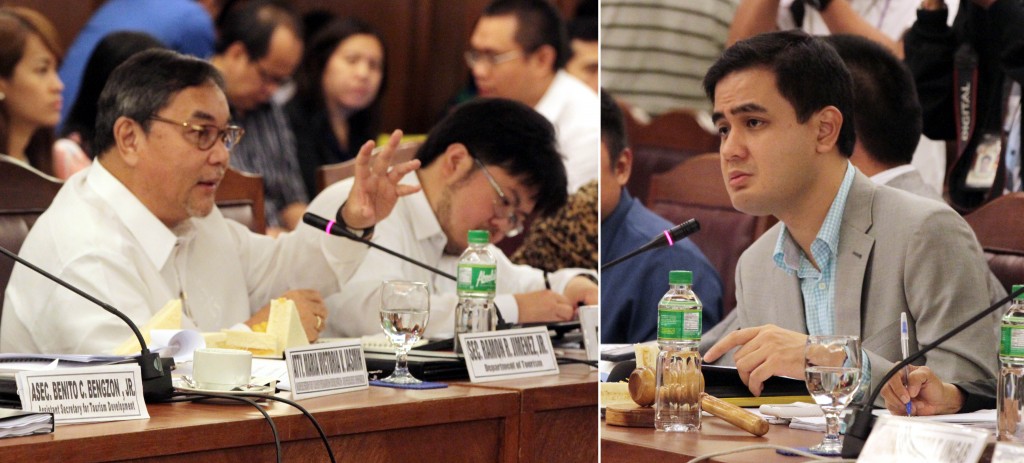Breaking
Proposed 2015 budget now available in open format –DBM

Department of Tourism (DOT) Secretary Ramon R. Jimenez (left) explains the proposed 2015 DOT Budget before the House Appropriations Committee at the House of Representatives in Batasan Hills, Quezon City on Wednesday (Aug. 14, 2014). Also in photo is Committee Vice Chairman Dakila Carlo Cua (right) of the Lone District of Quirino. (PNA photos by Jess M. Escaros Jr.)
MANILA — In line with the Aquino Administration’s continuing commitment to advance transparency, accountability and openness in the budget process, the Department of Budget and Management (DBM) announced on Monday that datasets on the proposed P2.606-trillion National Budget for 2015 are now available in open format.
Aside from the current portable document format (PDF), Budget Secretary Florencio “Butch” Abad said that the proposed 2015 National Expenditure Program (NEP) can now also be accessed in comma separated values (csv) format, a move that enhances budget accessibility for an empowered citizenry.
“Putting up the 2015 budget in open format is consistent with our strong bid for data and information openness, especially when it comes to how we manage public funds. With the proposed budget in open format, users will have an easier time searching for specific items within the proposed budget and navigating its sections. This is very helpful, given that the 2015 National Expenditure Program is made up of six bulky books altogether,” Abad said.
“Having our datasets in open format is also consistent with internationally recognized open data standards. Furthermore, this is in compliance with our concrete commitments as part of the Open Government Partnership (OGP) which we in the Aquino Administration are focused to deliver,” Abad added.
The Philippines is a member of the OGP, a global multilateral initiative that supports governments to promote transparency, accountability, and citizen empowerment, among others.
Abad added that the 2015 budget proposal contains a provision on Open Government Data, which specifically mandates a policy of openness for government datasets.
The specific provision requires all national government agencies, including constitutional offices, State Universities and Colleges (SUCs) and Government-owned and controlled corporations (GOCCs), to “adopt a policy of openness for all datasets created, collected, processed, disseminated, or disposed through the use of public funds to the extent permitted by applicable laws and subject to individual privacy, confidentiality, national security, or other legally-mandated restrictions.”
The provision also defines “openness” as having the datasets published by agencies be machine readable, in open formats, and released with open licenses.
“We want the 2015 budget plan to comply with international open data standards. Besides expanding public access to budget information, we’re also promoting greater citizen awareness and involvement in the whole budget process.
“The previous year alone has shown us that more Filipinos are so much more interested in the way the budget works and how the government spends public funds. Our efforts towards open data is a response to this, but it’s also a way for us to make sure that data transparency is properly institutionalized in the Philippine bureaucracy,” Abad added.





















